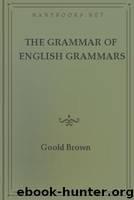The Grammar of English Grammars by Brown Goold

Author:Brown, Goold [Brown, Goold]
Language: eng
Format: mobi, epub
Tags: Non-fiction, Instructional, Language
Publisher: manybooks.net
* * *
IMPROPRIETIES FOR CORRECTION. FALSE SYNTAX UNDER RULE XVIII.
INFINITIVES DEMANDING THE PARTICLE TO.
"William, please hand me that pencil."--R. C. Smith's New Gram., p. 12.
[FORMULE--Not proper, because the infinitive verb hand is not preceded by the preposition to. But, according to Rule 18th, "The preposition to governs the infinitive mood, and commonly connects it to a finite verb." Therefore, to should be here inserted; thus, "William, please to hand me that pencil."]
"Please insert points so as to make sense."--Davis's Gram., p. 123. "I have known Lords abbreviate almost the half of their words."--Cobbett's English Gram., ¶ 153. "We shall find the practice perfectly accord with the theory."--Knight, on the Greek Alphabet, p. 23. "But it would tend to obscure, rather than elucidate the subject."--L. Murray's Gram., p. 95. "Please divide it for them as it should be."--Willett's Arith., p. 193. "So as neither to embarrass, nor weaken the sentence."--Blair's Rhet., p. 116; Murray's Gram., 322. "Carry her to his table, to view his poor fare,[413] and hear his heavenly discourse."--SHERLOCK: Blair's Rhet., p. 157; Murray's Gram., 347. "That we need not be surprised to find this hold in eloquence."--Blair's Rhet., p. 174. "Where he has no occasion either to divide or explain."--Ib., p. 305. "And they will find their pupils improve by hasty and pleasant steps."--Russell's Gram., Pref., p. 4. "The teacher however will please observe," &c.--Infant School Gram., p. 8. "Please attend to a few rules in what is called syntax."--Ib., p. 128. "They may dispense with the laws to favor their friends, or secure their office."--Webster's Essays, p. 39. "To take back a gift, or break a contract, is a wanton abuse."--Ib., p. 41. "The legislature has nothing to do, but let it bear its own price."--Ib., p. 315. "He is not to form, but copy characters."--Rambler, No. 122. "I have known a woman make use of a shoeing-horn."--Spect., No. 536. "Finding this experiment answer, in every respect, their wishes."--Sandford and Merton, p. 51. "In fine let him cause his argument conclude in the term of the question."--Barclay's Works, Vol. iii, p. 443.
"That he permitted not the winds of heaven Visit her face too roughly."--Shakspeare, Hamlet.
RULE XIX.--INFINITIVES. The active verbs, bid, dare, feel, hear, let, make, need, see, and their participles, usually take the Infinitive after them without the preposition to: as, "If he bade thee depart, how darest thou stay?"--"I dare not let my mind be idle as I walk in the streets."--Cotton Mather.
"Thy Hector, wrapt in everlasting sleep, Shall neither hear thee sigh, nor see thee weep." --Pope's Homer.
OBSERVATIONS ON RULE XIX.
OBS. 1.--Respecting the syntax of the infinitive mood when the particle to is not expressed before it, our grammarians are almost as much at variance, as I have shown them to be, when they find the particle employed. Concerning verbs governed by verbs, Lindley Murray, and some others, are the most clear and positive, where their doctrine is the most obviously wrong; and, where they might have affirmed with truth, that the former verb governs
Download
The Grammar of English Grammars by Brown Goold.epub
This site does not store any files on its server. We only index and link to content provided by other sites. Please contact the content providers to delete copyright contents if any and email us, we'll remove relevant links or contents immediately.
The Art of Coaching Workbook by Elena Aguilar(51198)
Trainspotting by Irvine Welsh(21663)
Twilight of the Idols With the Antichrist and Ecce Homo by Friedrich Nietzsche(18632)
Fangirl by Rainbow Rowell(9249)
Periodization Training for Sports by Tudor Bompa(8271)
Change Your Questions, Change Your Life by Marilee Adams(7780)
This Is How You Lose Her by Junot Diaz(6885)
Asking the Right Questions: A Guide to Critical Thinking by M. Neil Browne & Stuart M. Keeley(5775)
Grit by Angela Duckworth(5614)
Red Sparrow by Jason Matthews(5471)
Paper Towns by Green John(5189)
Room 212 by Kate Stewart(5119)
Ken Follett - World without end by Ken Follett(4731)
Housekeeping by Marilynne Robinson(4446)
The Sports Rules Book by Human Kinetics(4385)
Papillon (English) by Henri Charrière(4274)
Double Down (Diary of a Wimpy Kid Book 11) by Jeff Kinney(4268)
The Motorcycle Diaries by Ernesto Che Guevara(4098)
Exercise Technique Manual for Resistance Training by National Strength & Conditioning Association(4071)
